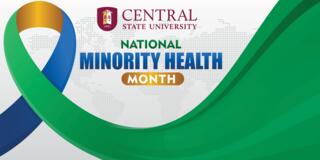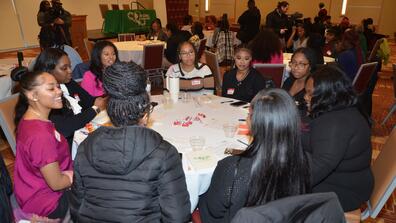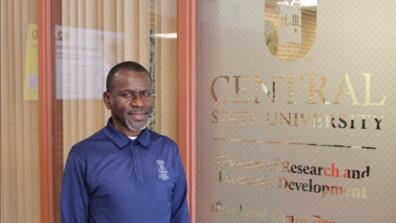Building a community of care starts here: How Central State champions mental health

Editor’s note: This is Part I in a series recognizing Minority Mental Health Month.
Each July, Central State University joins communities across the nation in observing National Minority Mental Health Awareness Month. Sometimes referred to as BIPOC Mental Health Month, the observance honors the legacy of author and mental health advocate Bebe Moore Campbell, who dedicated her life to removing the stigma around mental illness in communities of color (NAMI).
Minority Mental Health Month shines a light on the unique mental health challenges faced by Black, Indigenous, and People of Color (BIPOC) — challenges that are often shaped by systemic inequities, cultural stigma, and lack of access to care.
At Central State University, we recognize that mental wellness is a foundation for student success. As Ohio’s only public Historically Black College or University (HBCU) and 1890 Land-Grant Institution, we are committed to fostering a supportive environment where students feel safe, heard, and empowered to care for their whole selves.
“Mental health is an essential part of student success. At Central State, we’re intentional about creating a community where students feel seen, valued, and supported,” said Dr. Sonia Hunt, Director of Counseling Services and an alum. “By normalizing conversations around mental wellness, we’re breaking generational cycles of silence and empowering our students to thrive emotionally, academically, and personally.”
Uncovering the disparities
More than 1 in 5 adults in the U.S. experiences mental illness each year (CDC). However, Hispanic and Black adults are significantly less likely than white adults to receive mental health treatment — even when experiencing major depressive episodes (SAMHSA).
Among youth, the disparities are especially troubling. In 2019, Black female high school students (grades 9–12) were 60% more likely to attempt suicide than their white female peers (CDC Youth Risk Behavior Survey).
On college campuses, these statistics come to life in deeply personal ways. While Black students at HBCUs report better mental health outcomes than those at predominantly white institutions (PWIs), they still face gaps in support services, stigma, and limited culturally responsive care (University of Michigan School of Public Health, 2025).
At the state level, organizations such as Ohio Mental Health and Addiction Services (OHMHAS) are working to address disparities in behavioral health services and expand equitable access to care across Ohio’s diverse communities (mih.ohio.gov).
In 2019, Black female high school students (grades 9–12) were 60% more likely to attempt suicide than their white female peers.
Counseling Services: Here for every Marauder
At Central State, our Counseling Services team is dedicated to supporting the mental and emotional well-being of our students through inclusive, confidential, and holistic care. Led by Dr. Hunt, the office provides individual and group therapy, alternative modalities such as horticulture therapy and mindfulness, crisis response, workshops, and outreach programs that affirm the lived experiences of BIPOC students.
“We understand that mental health doesn’t exist in a vacuum,” she said. “It’s shaped by culture, history, and identity. That’s why we work hard to make sure our services reflect the unique needs of our diverse student population.”
Counseling Services also provides referrals, coping skills education, and support for students navigating trauma, anxiety, depression, and life transitions — all within a safe and culturally affirming space. Whether a student is seeking support for the first time or managing a long-term condition, they are met with compassion, not judgment.
When Dr. Hunt joined the staff at CSU in 2014, Counseling Services reached only 2% of the student population. She proudly boasts a much higher rate today, with 90% of students now touched by its services.

“By normalizing conversations around mental wellness, we’re breaking generational cycles of silence and empowering our students to thrive emotionally, academically, and personally.”
Dr. Sonia HuntDirector of Counseling Services
Healing through community
Research consistently highlights that HBCUs offer protective factors for mental health, such as strong peer networks, cultural belonging, and supportive faculty relationships (Black Enterprise; Inside Higher Ed).
Still, many BIPOC students face barriers to care, including fear of stigma, limited culturally competent providers, and economic hardship (Psych Central; MSN).
That’s why Central State is launching a Mental Health Awareness Series this month — amplifying voices across campus to spark dialogue, reduce stigma, and build a culture of care.
Upcoming features will explore:
- Reporting from a panel of students, staff, and community partners featured during the Suicide Prevention in the Black Community Summit, sponsored by the Ohio Suicide Prevention Foundation
- How faculty and staff are creating trauma-informed learning environments, including a high-impact Restorative Justice pilot program
- Student peer advocates and the power of shared experiences
- First-person accounts from students, faculty, staff, and alums
Join the movement
Minority Mental Health Month is not just a time to reflect — it’s a call to action. At Central State University, we’re answering that call by ensuring every Marauder has access to compassionate, culturally competent, and empowering mental health support.
To learn more about CSU Counseling Services or to schedule an appointment, visit www.centralstate.edu/counseling-services or call 937-376-6338.
For additional resources on mental health programs and initiatives across Ohio, visit mih.ohio.gov — the official site of the Ohio Commission on Minority Health.
You're not alone: Get help when you need it
If you or someone you know is experiencing a mental health crisis, help is available.
Call or text the 988 Suicide & Crisis Lifeline for free, confidential support from trained counselors 24/7.
You are never alone — and at Central State University, your wellness matters.
Stay tuned for more stories uplifting mental health in the CSU community throughout the year.


